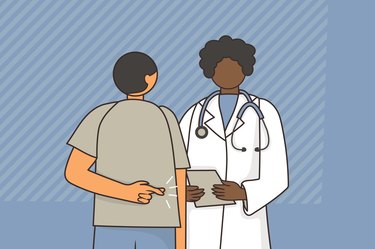
Stepping on the scale is one of the first things patients are typically asked to do at a doctor visit. But if weighing in makes you uncomfortable, you don't actually have to do it.
Yes, you read that right. Many patients assume that weight checks are a must at medical appointments. (After all, most medical professionals just tell you to step on the scale!) But the reading isn't mandatory, and in many cases, knowing how many pounds a person weighs has no impact on medical treatment.
Video of the Day
Video of the Day
"Though there are certain instances where getting weighed may be important, you always have the right to refuse, and your doctor should respect your boundaries and decisions," says Eric Ascher, DO, a family medicine physician at Lenox Hill Hospital in New York.
That's a message being spread by more and more body-positive practitioners, including ob-gyn Heather Irobunda and registered dietitian Jessie Furman. Here's a look at why you might want to opt out of stepping on the scale, and how to talk with your doctor about doing so.
The Possible Downsides of Getting Weighed
For many, stepping on the scale can be an unpleasant experience. "For some patients, getting weighed can be anxiety-provoking," Dr. Ascher says.
That's often true for people in larger bodies. People whose weight fall within the overweight or obesity spectrum can be stigmatized for their weight, including at doctor visits, per a February 2019 article in JAMA. That can lead to lower quality care and in some cases, even cause a person to avoid going to the doctor altogether, per a 2015 review published in AIMS Public Health.
Those with an eating disorder, a history of disordered eating, body dysmorphia or even a history of chronic yo-yo dieting may have difficulties with being weighed too.
"If seeing their weight brings back bad memories or brings them back to a time where they were experiencing a more disordered state of eating, it's worthwhile to skip the process or ask for a blind weigh-in," Dr. Ascher says.
Wait, Aren't There Benefits to Getting Weighed?
Weight can be an indicator of health, but it's not the only one.
"To me, weight is just a number. There are so many other markers of health like blood pressure, cholesterol and blood sugar," Dr. Ascher says. To many physicians, it's more important that a patient is making healthy eating choices and exercising than whether they weigh, say, 156 or 157.5 pounds.
That said, being aware of general weight trends — whether your weight is going up or down over the course of several months or a year — gives you the opportunity to address emerging health problems before they cause symptoms or long-term damage. "When we do lab work, if we notice increased cholesterol or blood sugar and weight has gone up as well, that opens a door to talk about lifestyle choices," Dr. Ascher says.
"Weight is just a number. There are so many other markers of health like blood pressure, cholesterol and blood sugar."
And in some cases, knowing a person's exact weight is necessary.
If a patient has a liver or kidney problem that causes significant water retention, weight gain could indicate that their disease is worsening. A doctor may also need to know a patient's weight in order to prescribe a medication dose. Children, too, need to have their weight checked to ensure that they're growing and developing at a healthy rate.
Weight monitoring may also be a must for individuals who are recovering from eating disorders. But in those cases, it's the healthcare provider who needs to see the scale number, not the patient, Dr. Ascher points out.
How to Talk With Your Doctor About Weight Checks
There's no rule saying you have to get weighed when you go to the doctor. But since weigh-ins tend to be standard procedure at most medical offices, you'll need to let your provider know if you'd prefer to opt out. Some on advice on how to do that:
Bring It Up Early
Let the nurse or physician's assistant know your preference at the start of your appointment, when they typically would do a weigh-in along with a blood pressure and temperature check.
"You can tell them that you'd prefer not to be weighed, or ask if you can discuss it with your doctor before being weighed," Dr. Ascher suggests.
Most doctors will respect your decision, even if they go on to explain why they prefer to know a patient's weight. But if yours disagrees or doesn't take your concerns seriously, they still shouldn't force you to do something you won't want to do.
Consider Bringing a Card
Some patients prefer to bring along a laminated card with a phrase such as "Please don't weigh me unless medically necessary." If you think it might be difficult to talk about being weighed, having a nonverbal notice to share can be less anxiety-provoking.
These cards can also help those living with eating disorders or body image issues express that they don't want to be weighed without disclosing their diagnosis.
Tip
You can purchase "don't weigh me" cards on More-Love.org (five cards for $5). The cards were created by founder of More-Love, Ginny Jones, in hopes of protecting children in particular (but now people of all ages) from body hate and eating disorders.
If you do not want to purchase the cards, it is possible to make your own. The card can say, "Please don't weigh me unless really medically necessary," or you can make one for your child: "Please don't weigh me child unless really medically necessary."
Request a Blind Weigh In
If you have a condition where it's necessary for your weight to be tracked, you can request that your weight to be taken without you seeing the number on the scale.
Consider Seeking Care Elsewhere
Should your doctor insist that you get weighed even if you don't want to, it's okay to leave and look for a provider who you feel more comfortable with. Some doctors are shifting focus toward weight-neutral and weight-inclusive care, to make people of all sizes feel comfortable getting care they need.
In fact, a July 2019 systematic review in Primary Health Care Research and Development found that weight bias negatively affects patients' engagement in primary health care, including a general distrust and lack of communication with doctors.
Tip
To find a weight-inclusive doctor or dietitian, search organizations like Health At Every Size or the National Eating Disorders Association, or do an Internet search for "weight-inclusive doctors near me." You know you'll find a good provider when weight is not the center of the conversation and you feel safe sharing your concerns and thoughts.
"If you feel that the provider isn't speaking the same language as you, you should seek the level of care you deserve," Dr. Ascher says.
You'll know you found a good provider when weight is not the center of the conversation, they listen to your thoughts and concerns and look beyond weight to get to the root of your medical issues.
- JAMA: "Addressing Medicine’s Bias Against Patients Who Are Overweight"
- AIMS Public Health: "Obesity and Healthcare Avoidance: A Systematic Review"
- Journal of Clinical Investigation: "Metabolically normal obese people are protected from adverse effects following weight gain"
- Medical Clinics of North America: "Maintenance of lost weight and long-term management of obesity"
- HAES.org
- NEDA
- Primary Health Care Research and Development: "Weight bias and health care utilization: a scoping review"
Is this an emergency? If you are experiencing serious medical symptoms, please see the National Library of Medicine’s list of signs you need emergency medical attention or call 911.


